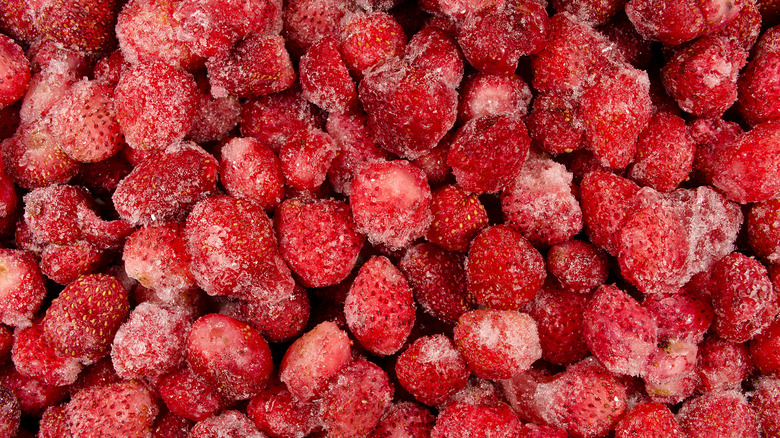The FDA Has Just Expanded The Frozen Strawberry Recall
As summer rolls in, it's only natural that certain types of summer fruits, such as watermelon and berries, will noticeably spike in sales. Because of the popularity of these fruits during summer, any contamination, whether through natural causes or synthetic chemicals, must be taken seriously to prevent a severe outbreak of illness. This is exactly the case regarding the recent recall of frozen strawberries.
According to a June 14 report from Food Safety News, the Food and Drug Administration discovered that several brands of frozen strawberries are linked to a recent series of hepatitis A infections. These brands include Walmart's Great Value brand and the Rader Farms brand, commonly found in Costco and HEB stores, both distributed by Willamette Valley Fruit. Although the company quickly recalled the suspected products, what's most shocking is that Walmart locations across 33 states may have been carrying the supposedly tainted fruit. Costco stores across Colorado, Texas, California, and Arizona were also found to be carrying the suspected contaminated fruit.
Walmart, Costco, and HEB aren't the only stores carrying the recalled item. Many more stores across several states have also been noted as carrying the contaminated frozen fruit. Just how many stores and brands have been affected by this mass recall?
Other stores involved include Trader Joe's and Aldi
As the FDA continues its investigation, it's clear that the named stores and their respective brands are not the only ones affected by this recall. Other businesses include Trader Joe's, Aldi, KeHE, Vital Choice Seafood, PCC Community Markets, and Meijer. Notably, Trader Joe's is the only store listed selling the tainted fruit nationwide, while the other businesses are said to have been affected in specific states.
But how exactly could all these brands and businesses sell contaminated frozen strawberries? According to the FDA, the answer is that all of the strawberries come from the same growing region in Mexico, making it much easier for contamination to spread. As it's impossible to tell which strawberries from that region are clean or contaminated, a massive recall is the only way to remove all tainted products from the market.
So far, nine individuals in Washington, Oregon, and California have been reported to have contracted Hepatitis A as of June 13. Fortunately, though, no deaths have been reported. Although it is unclear when the recall will be lifted or just how many products were truly contaminated in total, it's still better to be safe than sorry, especially when it comes to produce as popular as strawberries.

